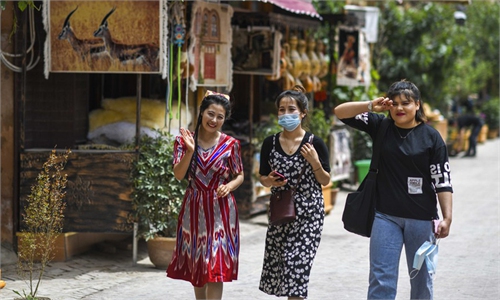
People promote Hami melons via livestreaming in Turpan of northwest China's Xinjiang Uygur Autonomous Region, May 19, 2021.Photo:Xinhua
Several US officials, citing China's Xinjiang Uygur Autonomous Region, vowed trans-departmental efforts to look into the supply chain and better tackle the so-called forced labor problem at a virtual event of the US Chamber of Commerce, which shows that the Xinjiang issue has become a "click bait" that American politicians use, and government actions are likely to follow despite opposition from the business world, observers said.
Josh Kagan, acting assistant trade representative for labor, told attendees of the Friday event "we want to be in partnership with the business community and recognize that you are an important player in the global fight against forced labor."
Kagan, together with other US officials, mentioned a recent government advisory asking US firms to stay out of the Xinjiang supply chain. Kagan claimed ethnic minorities in Xinjiang are forced to work in the carpet, garments, footwear, yarn and solar power industries.
Those groundless claims have been repeatedly refuted by Chinese authorities and Xinjiang locals but the Biden administration and other US' politicians "kept pretending to be asleep," observers said.
Jia Chunyang, an expert at the China Institutes of Contemporary International Relations, told the Global Times on Monday that US officials' remarks, making at an event of US Chamber of Commerce, are targeting US business community, urging them to yield to the political trend of playing "human right card" to crack down on Xinjiang.
"Though it was a non-official circumstance, it represented the direction of US government actions," Jia said.
Stefan Marculewicz, co-chair of the US Chamber of Commerce's International Law Subcommittee and co-chair of the business and human rights practice group at US law firm Littler Mendelson, expressed concerns over the government inclination.
When governments move beyond disclosure and transparency laws to requiring measures to identify and avert human rights risks, that's problematic, Marculewicz said.
The US Chamber is "deeply concerned" about legislation that would impose a one-size-fits-all solution, and is troubled by the possibility that Congress could pass laws that lead companies to pull out of developing countries altogether, depriving poor people of the income they rely on.
Jia believes that Marculewicz's words reflected the US business community and elites' discontent and opposition to US government actions.
They know the US government does not care about labor rights in Xinjiang. It is just using the topic to entangle pillar industries in the region, which will end up hurting US firms that trade with the Xinjiang region, Jia said.
With the recently renewed advisory, the US government showed its inclination of expanding and escalating a crackdown on Xinjiang industries and other Chinese firms doing business related to Xinjiang.
"Such escalation, if it continues, will make US firms unable to do business with a huge amount of Chinese companies, losing suppliers and market," Jia said.
Foreign apparel brands have seen sharp drops in their sales in China after cutting ties with Xinjiang cotton, as they are facing boycotts from Chinese consumers.
For the photovoltaic industry, US companies will struggle to find substitutes in the short run if they do not buy Chinese solar panels. The harm to the US will be much larger than the losses caused to Chinese companies, industry veterans told the Global Times earlier.


